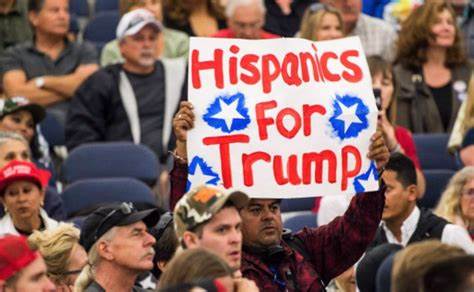Recent polling data indicates a notable shift in support among U.S. Latino voters, with former President Donald Trump narrowing his gap against Vice President Kamala Harris among Hispanic men. According to a recent Reuters/Ipsos poll, Trump is trailing Harris by only two percentage points among this demographic, garnering 44% of their support compared to Harris’s 46%. This represents a significant change from the 2020 election cycle when Trump was facing a 19-point deficit against then-candidate Joe Biden among Hispanic voters. The analysis draws upon over 15,000 responses gathered in the month leading up to October 21, highlighting a broader trend of shifting allegiances within the Hispanic electorate.
The dynamics of the electoral landscape are changing, as Trump’s improved standing with Hispanic men contrasts with Harris’s gains among white women. In late 2020, Trump had a substantial lead among white women, favored by 12 points over Biden; however, that advantage has diminished to a mere 3-point lead in the current polling, with 46% support for Trump compared to 43% for Harris. This evolution reflects a shifting coalition in which both candidates are striving to appeal to different voter bases, with Trump making strides among minority voters and Harris attempting to erode the Republican edge among white voters.
A significant factor in this change is the growing importance of the Hispanic voter base, which is the fastest-growing segment of the U.S. electorate. CNN’s report emphasizes not only the shift in opinions within the Hispanic community but also highlights the ongoing trend of increased support for Trump among Cuban-American voters. A striking 55% of registered Cuban American voters now identify as Republicans, signifying a commendable turnaround in partisan alignment that could influence the upcoming elections.
Experts suggest that this trend among Cuban Americans is driven by a desire for a nuanced policy approach toward their homeland. As Sebastian Arcos, the interim director of the Cuban Research Institute, points out, Cuban Americans favor a blend of sanctions against the Cuban regime while simultaneously seeking engagement with the Cuban populace. This perspective underscores a greater understanding of the complexities of U.S.-Cuba relations compared to traditional political observers, suggesting a grounded rationale for the Cuban American support for Trump, rooted in the firmness of maintaining the U.S. embargo.
Both noted the demographic shifts are pivotal as candidates strategize for the future electoral battleground. The changing political allegiances among minority voters continue to shape campaign strategies, compelling candidates to both expand their outreach to essential voter segments and sharpen their messaging to resonate with diverse constituents. The Republicans’ growing appeal among Hispanic men brings into question the conventional wisdom of Democrats regarding their stronghold on the Hispanic vote.
As the election approaches, these shifts in voter sentiment could prove crucial in determining the outcome. The evolving coalition dynamics underscore the importance of understanding the complex factors influencing voter preferences and highlight the growing competitiveness of both parties for key demographic groups. With Hispanic voters increasingly becoming a critical voting bloc, the outcomes of future elections may hinge on how effectively candidates address the diverse needs and concerns of this segment of the population.

